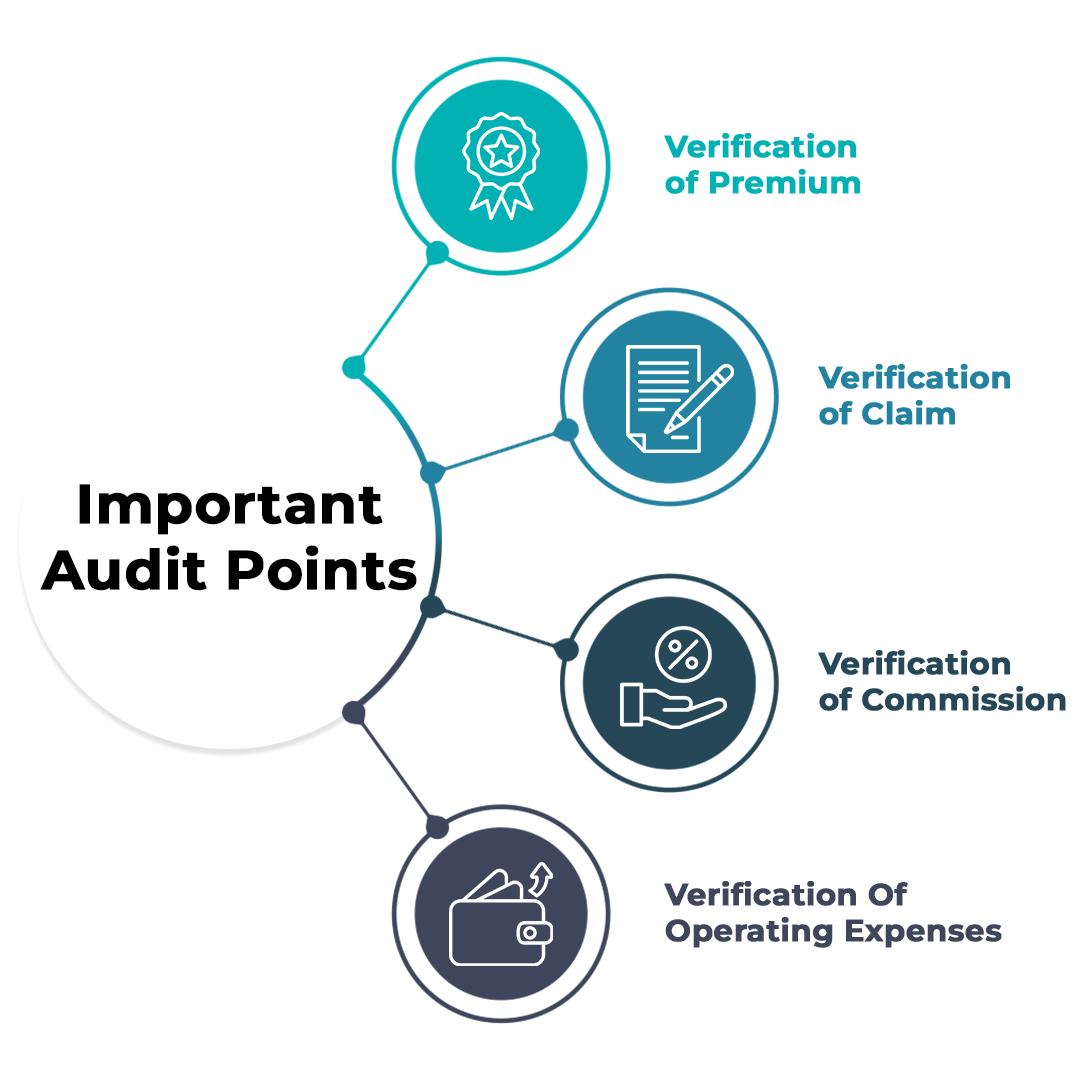
Get a Quote
Get a Quote and Find Services to Fit Your Needs 50000+ Satisfied Clients
5000+ Licenses & Registration
15 Branches across India
75 Years + Combined experience
In India, insurance companies are established under the Companies Act of 2013. The definition of insurance audit is clearly outlined in section 12 of the Insurance Act 1938. As per this act, every insurance company is required to conduct an annual financial statement audit. This idea of insurance audits was commenced by the government in the year 1999 through the IRDA Act. Every insurer should prepare the following in accordance with their insurance business:
So, all of this must be done as per the IRDA regulations at the end of each financial year. The audit of insurance is done by professionals, it is an independent exam of accounting records. After evaluating the records, the professional will provide advice about the improvement in the records. Below is shared why auditors of insurance companies are required and the process of checking the P&L and Balance Sheet. Check to know different aspects of insurance audits.
In the audit of insurance companies, the evaluation of insurance policies is done. While conducting an insurance audit, it is checked whether insurance rates and premiums include facilities for insurance coverage or not. Also, the audit ensures that all insurance companies are adhering to established laws and regulations.
The previous claims made to the insurance company are also checked during the audit process. It is done to confirm whether the company has excluded any previous claims. However, insurance audits are crucial in maintaining a positive relationship between policyholders and insurance companies. The audit process provides guidance to insurance companies on how to attract and satisfy more customers.
However, the insurance surveyor and loss assessor investigates the loss of insurance claims, and the auditor of insurance companies checks the issues in your insurance business. Both of them assure that policyholder will get proper services, so their financial future can become safe.
Below are the important points that must be checked in the profit and loss account of the insurance company:

For proper management of premium collections, the amounts are credited to a separate bank account that cannot be used for general expenditures. The policy of the insurance company shows that premium collections are transferred to either the Regional or Head Office.
Section 64VB of the Insurance Act, of 1938 requires the insurer to receive premium payments before assuming any risk. For auditors, verifying premiums is crucial because they are collected upon issuing policies and considered the insurance company's risk-taking.
To check the accuracy of the business, the auditor must gather information from each division/branch of business. Then the auditor must check the total number of documents to be reviewed and should prioritize the claim provisions of higher value. Claims under policies include both paid losses and estimated/anticipated claims pending settlement.
However, all payments, including repair charges, fire fighting expenses, police report fees, survey fees, court-ordered amounts, travel expenses, and photograph charges, are debited to the Claim Account. The auditor of insurance companies should check that:
The agents receive remuneration for businesses procured, in the form of a commission. So, this is based on a percentage of the premium collected and it is debited to the Commission on Direct Business Account. As an auditor, it is important to verify the following:
The 13 heads of administrative expenses are classified under 13 heads as mentioned in Schedule IV. So, the auditor should check:
The following are the key elements that must be checked during the insurance audit of the balance sheet:

To examine an insurance company's investments, the auditor must be aware of the regulations outlined in the Investments of the Insurance Act, of 1938. The regulations are as follows:
In the cash and bank balances the auditor must check the following financial statements of the insurance company:
In an insurance companies audit the agent checks the balance, and then the following procedures should be followed:
As per the guidelines, the insurance companies must form some important committees and these are as follows:
The purpose behind commencing these audit committees is as follows:
As per Section 177 of the Companies Act, 2013, it is mandatory for every insurance company to establish an Audit Committee. This committee is responsible for reviewing the financial statements, statements of cash flow, and financial reports on an annual and quarterly basis.
The Audit Committee chairperson will be an Independent Director of the Board with expertise in accounting, finance, or audit. Also, he/she can be a Chartered Accountant or someone with a strong financial analysis background. The CEO's involvement with the Audit Committee should be limited to situations where specific information regarding insurance companies audit findings is required.
The Committee should consist of at least three directors, with the majority being Independent Directors. So, the committee is responsible for overseeing the internal audit department's efficient functioning and reviewing its reports. Before the audit begins, the Audit Committee should discuss the nature and scope of the audit with the statutory auditors and hold post-audit discussions to address any areas of concern.
To conclude, the insurance audit is a process of monitoring different domains of the insurance process. This includes evaluating insurance documents, liabilities, risk valuation and financial statements. In the audit process, checking the internal control system and checking its effectiveness is important to find potential errors. So, the professional with the knowledge of audit can help you.
People Also Read: Roles and Functions of IRDA in the Insurance Sector

Hey there, I'm Dushyant Sharma. With the extensive knowledge I've gained in past 8 years, I have been creating content on various subjects such as banking, insurance, telecom, and all the important registration and licensing processes for various companies. I'm here to help everyone with my expertise in these areas through my articles.
Want to know More ?